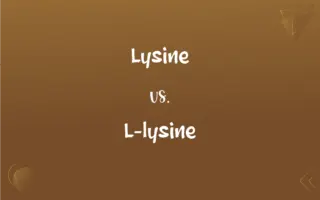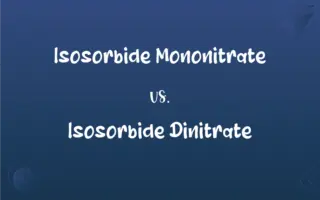Pedantry vs. Pedanticness: What's the Difference?
By Janet White || Updated on May 22, 2024
Pedantry refers to excessive concern with minor details and rules, while pedanticness describes the quality of being pedantic, often implying a more rigid and overbearing adherence to these details.

Key Differences
Pedantry is the act or practice of being overly concerned with formal rules and trivial points of learning. It often involves showing off one's knowledge in a way that is seen as overly meticulous or nitpicky. Pedanticness, on the other hand, is the characteristic or quality of being pedantic. It focuses on the behavior or attitude of a person who exhibits pedantry.
In everyday interactions, pedantry can be seen when someone overly emphasizes minor details, often to the annoyance of others. This behavior is frequently perceived as pretentious or show-offish. Conversely, pedanticness is a broader term that encapsulates the overall nature or demeanor of someone who consistently engages in pedantic behavior, often making them come across as rigid or overly concerned with correctness.
Pedantry often manifests in academic or intellectual contexts, where precise knowledge and accuracy are valued. However, when taken to an extreme, it can hinder practical understanding and effective communication. Pedanticness, as a trait, can be off-putting because it reflects a persistent tendency to prioritize trivial details over broader, more meaningful discourse.
The terms differ in that pedantry focuses on the actions and instances of nitpicking, whereas pedanticness encompasses the general disposition or habitual behavior of being overly meticulous about minor details.
Comparison Chart
Definition
Excessive concern with minor details and rules
Quality of being pedantic
ADVERTISEMENT
Focus
Actions and instances
General disposition or behavior
Context
Often in academic or intellectual settings
Broader characteristic of a person
Connotation
Negative, implying unnecessary nitpicking
Negative, implying rigid adherence
Example Sentence
"His pedantry in correcting grammar annoyed everyone."
"Her pedanticness makes conversations very tedious."
Pedantry and Pedanticness Definitions
Pedantry
Display of academic knowledge in an overly meticulous way.
The lecture was filled with unnecessary pedantry.
ADVERTISEMENT
Pedanticness
Habitual nitpicking.
Pedanticness in debates can lead to unnecessary arguments.
Pedantry
Nitpicking over trivial details.
Her pedantry in meetings slowed down progress.
Pedanticness
Rigid adherence to rules or academic learning.
His pedanticness was evident in his strict teaching methods.
Pedantry
Excessive concern with minor details and rules.
His pedantry about the proper use of semicolons was frustrating.
Pedanticness
Tendency to focus on minute details excessively.
Her pedanticness made it hard to enjoy casual conversations.
Pedantry
Overemphasis on formal rules.
The writer's pedantry detracted from the novel's story.
Pedanticness
Annoying tendency to correct trivial mistakes.
The manager's pedanticness irritated the entire team.
Pedantry
Showing off one’s learning or knowledge.
He was accused of pedantry when he corrected everyone's pronunciation.
Pedanticness
Quality of being overly concerned with minor details.
Her pedanticness often made her seem unapproachable.
Pedantry
The ostentatious display of academic knowledge, or undue attention paid to minor details or formal rules
His detailed research was dismissed as pedantry.
Pedanticness
(rare) pedantry.
Pedantry
An instance of pedantic behavior
Grew tired of his pedantries.
Pedantry
An excessive attention to detail or rules.
Pedantry
An instance of such behaviour.
I don’t want to listen to your pedantries anymore.
Pedantry
An overly ambitious display of learning.
Pedantry
The act, character, or manners of a pedant; vain ostentation of learning.
'T is a practice that savors much of pedantry.
Pedantry
A ostentatious and inappropriate display of learning
FAQs
How is pedantry used in a sentence?
E.g., "His pedantry in correcting grammar annoyed everyone."
How is pedanticness used in a sentence?
E.g., "Her pedanticness makes conversations very tedious."
What is pedantry?
Pedantry is excessive concern with minor details and formal rules.
Is pedantry always negative?
Generally, yes, it is seen as overly meticulous and nitpicky.
What is pedanticness?
Pedanticness is the quality or state of being pedantic.
Can pedantry be useful?
Sometimes, especially in contexts requiring precision, but it can also be annoying.
Can pedanticness be useful?
Rarely, as it often hinders effective communication and collaboration.
What is an example of pedantry in academia?
Overly focusing on minor citation errors instead of the content of a paper.
What is an example of pedanticness in everyday life?
Constantly correcting people's grammar during casual conversations.
How does pedantry affect communication?
It can make communication tedious and frustrating by focusing on trivial details.
Is pedantry common in any specific field?
Yes, it is often found in academic, legal, and technical fields where precision is valued.
How does pedanticness affect relationships?
It can strain relationships by making interactions feel overly critical and inflexible.
Can someone change their pedanticness?
With self-awareness and effort, someone can become less pedantic.
Why is pedantry often viewed negatively?
Because it focuses on trivial details at the expense of more important issues.
Is pedanticness always negative?
Yes, it implies a rigid and overbearing adherence to minor details.
How can pedantry hinder progress?
By bogging down discussions with unnecessary details and corrections.
Is pedanticness the same as being detail-oriented?
No, being detail-oriented is usually positive, while pedanticness is overly excessive and negative.
Can pedanticness be a cultural trait?
It can be more common in cultures that highly value formal education and precision.
Is pedanticness a personality trait?
Yes, it describes a habitual behavior or attitude of being overly meticulous.
Can pedantry be a sign of expertise?
Sometimes, but it is often seen as showing off rather than helpful.
About Author
Written by
Janet WhiteJanet White has been an esteemed writer and blogger for Difference Wiki. Holding a Master's degree in Science and Medical Journalism from the prestigious Boston University, she has consistently demonstrated her expertise and passion for her field. When she's not immersed in her work, Janet relishes her time exercising, delving into a good book, and cherishing moments with friends and family.






































































